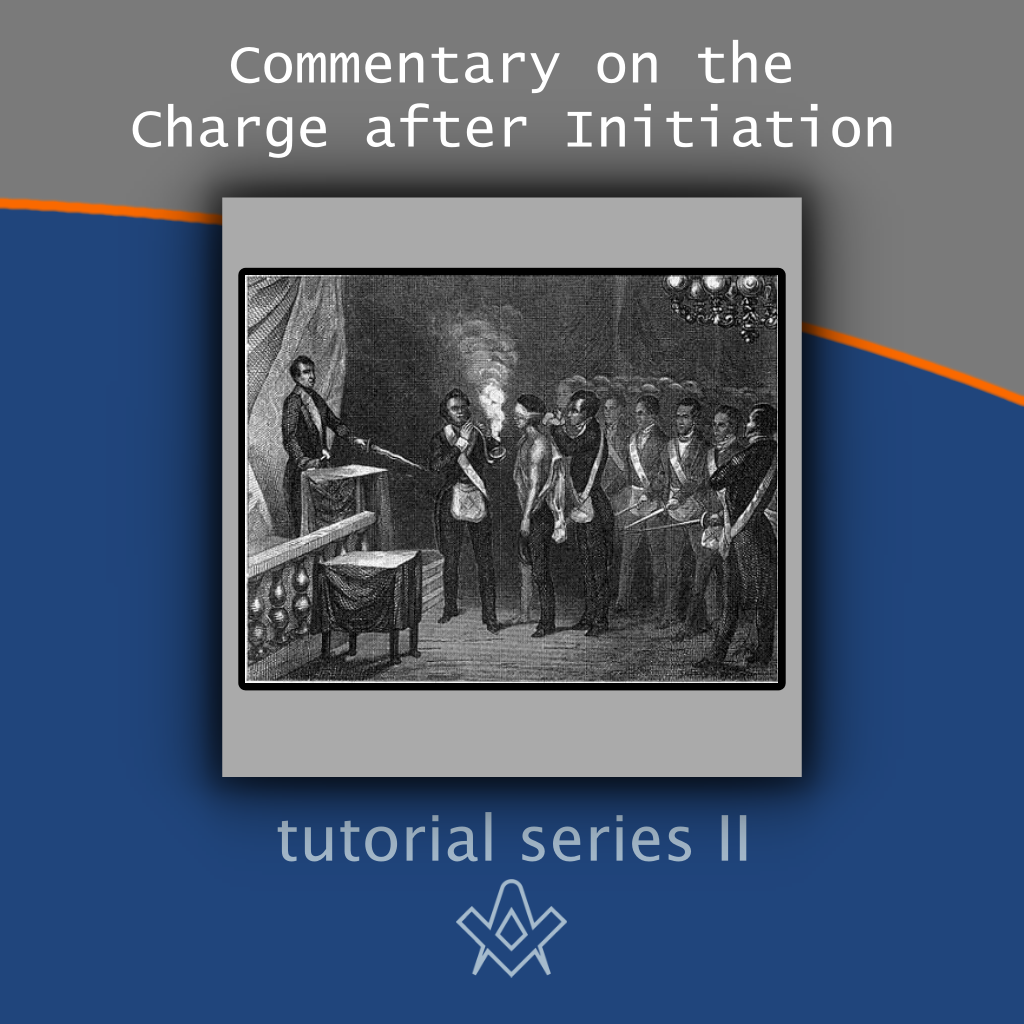In order for us to understand the Charge after Initiation I feel it is important to know a little of our Masonic origins. Let us therefore have a brief look at craft “Guilds”.
A guild is:
![]()
an association of craftsmen or merchants formed for mutual aid and protection and the furtherance of their professional interests
– Britannica.com
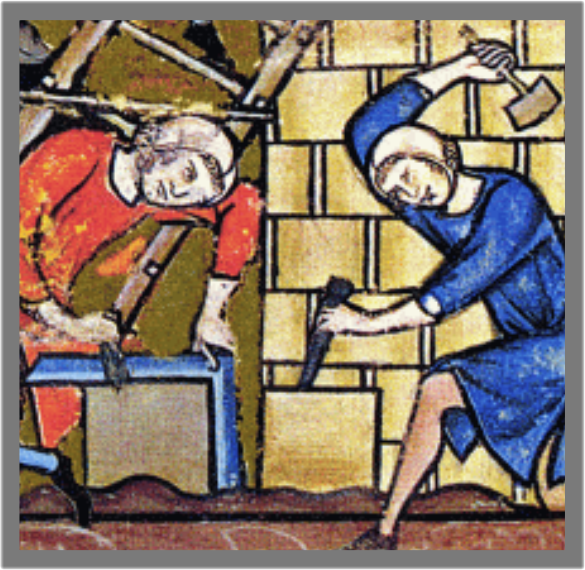
Apprentice, Journeyman, and Master: The Medieval Guild – philosophicalsociety.org
IMAGE LINKED: wikimedia Attribution 4.0 International (CC BY 4.0)
Guilds were at their height in Europe between the 11th and 16th centuries. Of the two types of Guilds, Merchant and Craft, we will be looking more specifically at the Craft Guilds.
The Craft Guilds would consist of Master Craftsmen in a town or city coming together to regulate the standard of work, pay and conditions for that industry.
Each industry would have their own Guild of artisans and craftsmen.
For example, Guilds of weavers, dyers and fullers in the wool trade, and masons and architects in the building trade. Other Guilds included; blacksmiths, butchers, bakers etc.
The Guilds became very influential in local government and in the local economy. They were also very heavily into helping their members, improving their community and philanthropy.
A Master Craftsman would have apprentices who would learn the secrets of their trade. The apprentices would be in early adolescence, about 14 years of age, and would complete an apprenticeship of between five and nine years.
They received no pay but were given food and lodgings. In fact, some families paid the Master Craftsman for their son to serve an apprenticeship with them.
Maintaining a good reputation as a man as well as a Master Craftsman meant there was work. Living with the Master Craftsman, the apprentice was taught to respect the Master’s wife, his daughter, and his maid.
He would be dressed appropriately at the meal table and be prompt. He would treat all the Master’s clients courteously for that would bring in the work.
If he did not keep to this professional and personal standard he was sent back to his own family, unqualified.
After completing their apprenticeship the qualified craftsman would then become a journeyman, travelling from job to job, Master to Master, following the work and honing his skills.
To become a Master himself he must produce a “masterpiece” which would be judged by established Masters in the Guild.
If successful he could then open up a workshop of his own with his own apprentices working to the high standard set by the Guild not only in the work produced but also as a citizen, ensuring that they did not bring the Guild into disrepute.
The Guilds held their own professional courts to investigate complaints in order to maintain their high standing in the community.
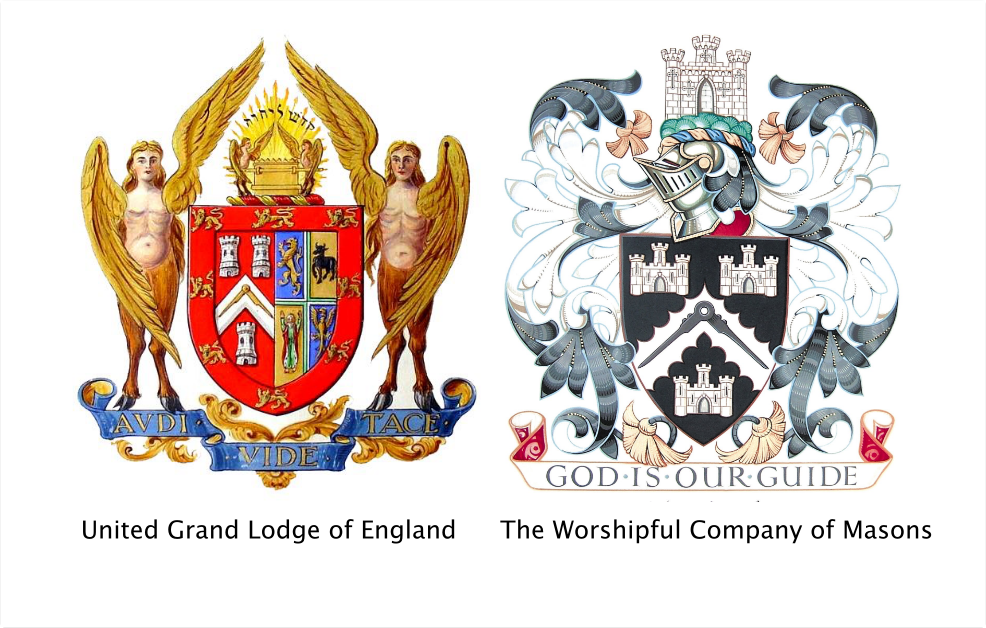
It is at the heyday of the Guilds (or in London the Livery Companies) that Freemasonry has been alleged to originate.
If we look at the Coat of Arms of the United Grand Lodge of England you will see, on the left as you look at it, three castles a chevron and compasses.
This was also that of the “Moderns” and the Coat of Arms of the Worshipful Company of Masons registered with the College of Arms in 1472, but with a sable (black) field and not gule (red) field as in that of the UGLE Coat of Arms, which itself was registered in 1919.
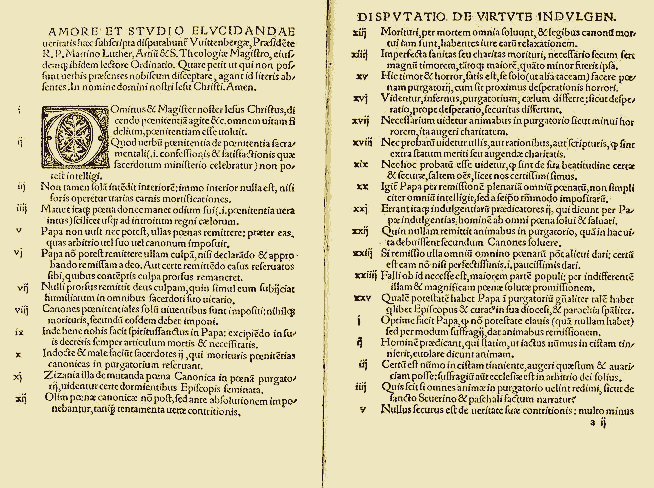
At the time the Guilds were developing in Europe, Europe was going through religious turmoil.
It was a time of pilgrimages and the Crusades of the Middle Ages. The English monarchs from Henry VIII (28 June 1491 – 28 January 1547) to William III (4 November 1650 – 8 March 1702) were changing between Catholicism and Protestantism.
A period known as the Reformation which began in 1517 and culminated in the Act of Settlement in 1701, stating that the Monarch had to be a Protestant.
England during this period was very religious to the point that employers, members of the Guilds, insisted their employees attended church.
The reputation of the Guilds (or in London the Livery Companies) became such that honourable and established Freemen of the town or city wanted to be associated with them and so these honourable men were accepted as social or “speculative” members, hence the phrase “Free and Accepted or Speculative”.

Now let us compare the Charge after initiation with what we have learned from the above information.
Video Presentaion
Bro. AB, as you have passed through the ceremony of your initiation, let me congratulate you on being admitted a member of our antient and honourable institution.
Ancient no doubt it is having subsisted from time immemorial, and honorable it must be acknowledged to be, as by a natural tendency it conduces those so who are obedient to its precepts.
Indeed, no institution can boast a more solid foundation than that on which Freemasonry rests – the practice of every moral and social virtue.
And to so high an eminence has its credit been advanced that in every age monarchs themselves have been promotors of the art, have not thought it derogatory to their dignity to exchange the sceptre for the trowel, have patronised our mysteries and joined in our assemblies.
The fact that there is a “ceremony” of admittance indicates that you are entering something which is quite special and not a job. It is special because the people in the Institution make it so.
They have a code of moral conduct which they put into practice that makes them deserving of respect – being “honourable”.
![]()
Words have to become deeds…
– Rev. Neville Barker Cryer: What do you know about Ritual?
The Rev. Neville Barker Cryer argues that “Antient” refers to the fact that it is old and its precepts can be traced back to the Guilds.
The word “immemorial” means “originating in the distant past”; again, he argues, referring back to the Guilds and not to the Egyptians or the Greeks.
In the original make up of a Freemasons’ Lodge, the newest member would be given an apron and trowel, and acts as the Inner Guard.
He would prick the chest of the Initiate with the trowel to test one of the five senses on the Initiate’s entrance to the Lodge. The Initiate would then become the newest member and take on that role. We now use a poniard in place of the trowel.
Monarchs have “exchanged the sceptre for the trowel” referring to the likes of Edward VII (9 November 1841 – 6 May 1910) as Prince of Wales and George IV (12 August 1762 – 26 June 1830) as the Prince of Wales and Prince Regent, taking the humblest of positions, the Inner Guard, as the newest Lodge member.
As a Freemason, let me recommend to your most serious contemplation the VSL, charging you to consider it as the unerring standard of truth and justice and to regulate your actions by the divine precepts it contains.
Therein you will be taught the important duties you owe to God, to your neighbour and to yourself.
To God, by never mentioning his name but with that awe and reverence which are due from the creature to his Creator, by imploring His aid in all you lawful undertakings, and by looking up to Him in every emergency for comfort and support.
It is in the VSL, which in English Lodges must be the whole Bible and must be open in order to make the Lodge ‘regular’, that we find the precepts that “regulate our actions”.
Books of other faiths may lay upon or alongside the Bible in English Lodges if it is requested of the candidate but not replace it. It signifies the unity of faiths.
The Bible is not just a gesture to religion it is the “unerring guide” to our actions and so it must be present and open to enable it to be read by the Master when he “employs and instructs the Brethren in Freemasonry”.

In the ceremony of Initiation you are asked “In all cases of difficulty and danger in whom do you place your trust?”
A question that must be answered truthfully to fulfil a requirement of entry into our Institution.
Above the Ark of the Covenant on the Coat of Arms of United Grand Lodge of England is written in Hebrew “Holiness to the Lord” and on the Coat of Arms for the Worshipful Company of Masons is written the motto “God is our guide”.
To your neighbour , by acting with him on the square, by rendering him every kind office which justice or mercy may require, by relieving his necessities and soothing his afflictions, and by doing unto him as in similar cases you would wish he would do to you.
By “acting with him on the square” that is to say by acting with reverence and high morals both practically and emotionally, as well as financially to help your fellow man. Bible quote: “Love your neighbour as yourself” (Mark 12:31)
And to yourself, by such a prudent and well regulated course of discipline as may best conduce to the preservation of your corporeal and mental faculties in their fullest energy, thereby enabling you to exert those talents wherewith God has blessed you, as well to His glory as the welfare of your fellow creatures.
To set yourself “a course of discipline”, a daily routine, which looks after your mental as well as physical health.
At the time of the Guilds, if you were not at your best mentally and physically you were not able to do the work that would enable you to provide for your family, or be in a position to help others.
There are not many Institutions that encourage the use of memory to express knowledge. A great benefit to mental wellbeing.
As a citizen of the world, I am to enjoin you to be exemplary in the discharge of your civil duties,
by never proposing or at all countenancing any act that may have a tendency to subvert the peace and good order of society,
by paying attention to the laws of any State which may for a time become the place of your residence or afford you its protection,
and above all, by never losing sight of the allegiance due to the Sovereign of your native land, ever remembering that nature has implanted in your breast a sacred and indissoluble attachment towards that country whence you derived your birth and infant nurture.
Early Guilds existed by a Warrant or Charter signed by the Monarch and so the allegiance of Guild members was to the Crown.
Within our ranks over the years we have had future kings and our present Grand Master, His Royal Highness the Duke of Kent, is of Royal blood and the cousin of Queen Elizabeth II.
The civil wars of the 17th century brought disorder throughout the land but the Guilds pledged to the monarch to be peaceful and law abiding and so it is today.
As an individual, let me recommend the practice of every domestic as well as public virtue:
let Prudence direct you,
Temperance chasten you,
Fortitude support you
and Justice be the guide of all your actions.
Be especially careful to maintain in their fullest splendour those truly Masonic ornaments, which have already been amply illustrated – Benevolence and Charity.
What you do in both your public and private lives will have an effect on your reputation and consequently on that of the Institution.
Operative Masters in the past had to look after their apprentices, aged between 14 and 21, so they demanded respectful, polite, and virtuous behaviour; to be a good man and uphold a good reputation so that the Master Craftsman’s business continued to prosper.
To follow the dictates of Prudence, Temperance, Fortitude and Justice, to be a credit to yourself and of benefit to your trade or calling.
Still, as a Freemason, there are other excellences of character to which your attention may be peculiarly and forcibly directed: amongst the foremost of these are Secrecy, Fidelity and obedience.
Secrecy consists of an inviable adherence to the obligation you have entered into – never improperly to disclose any of those Masonic secrets which have now been, or may at any future period be, entrusted to your keeping, and avoid all occasions which may inadvertently lead you so to do.
The Master Craftsman would convey a way of producing an item that is unique to his trade to his apprentices – a trade secret.
He would not want that secret to be conveyed to people outside of his craft, for that would have a very strong effect on his business, his livelihood, and his reputation.
The only secrets we have in Freemasonry are the manner in which we recognize each other.
In conveying those secrets to people outside of the “Craft” would endanger the reputation of our members. A reputation that has been built up over three centuries. It is a test of your integrity.
Your Fidelity must be exemplified by a strict observance of the Constitution of the fraternity,
by adhering to the ancient Landmarks of the Order,
by never attempting to extort or otherwise obtain the secrets of a superior degree,
and by refraining from recommending anyone to a participation of our secrets unless you have strong grounds to believe that by a similar fidelity he will ultimately reflect honour on your choice.
Fidelity means “faithfulness to a person, cause, or belief, demonstrated by continuing loyalty and support.”
It is, therefore, important that you take time to read our Constitution for therein you will be “instructed in the duties you owe to the Craft in general” and from our By-laws “the duties you owe to this Lodge in particular”.
With regard to the “antient Landmarks of the Order”, it must be noted that Freemasonry does not have a controlling authority over individual Grand Lodge, so the “antient Landmarks” may vary around the world. However these are six of the most common:
1. Belief in a Supreme Being or monotheism.
2. Belief in the immortality of the soul.
3. A book or volume of the sacred law as an indispensable part of the “furniture” of the Lodge.
4. The legend of the third degree .
5. The secrets of Freemasonry. The modes of recognition and the symbolic ritual of the Lodge.
6. That a Mason be a man, freeborn, and of lawful age.
It is easy enough, nowadays, to find the secrets of a superior degree but why would you want to? It would take away the mystery and drama of the ceremonies and make them less of a learning experience.
It would also bring into question your own integrity, for being pressed further you would soon fall foul and identify yourself as someone not entitled to the rank, a “cowan”, one who works as a Mason without having served a regular apprenticeship.
A whole debate can be had on the recommendations of candidates. Who really knows another? What goes on behind closed doors?
When Master Craftsmen selected their apprentices they would go by word of mouth, recommendations, and the reputation of the prospective candidate’s family, but it is not until the apprentice works through the skill sets set by the Master Craftsman that a true indication of worth can be gained.
What can be established is the character of the candidate by references from reputable sources and face to face time, both of which can be an act.
His true character will be tested thoroughly during his apprenticeship.
The Revd. Neville Barker Cryer writes: “imagine that person (the prospective candidate) standing where the recipient of this Charge would stand and ask the question, is he someone who will happily respond to this list of requirements or do they not fit his character?”
Your obedience must be proved by a strict observance of our laws and regulations,
by prompt attention to signs and summonses,
by a modest and correct demeaner in the Lodge,
by abstaining from every topic of political or religious discussion,
by a ready acquiescence in all votes and resolutions duly passed by a majority of the Brethren
and by perfect submission to the Master and his Wardens whilst acting in the discharge of their respective offices.
You can only know our laws and regulations by reading the Constitutions and By-laws. It doesn’t have to be done in one chunk. Read little and often.
Make a habit of replying to summonses sent by the Secretary the same day. He has a lot of work to do putting a meeting together.
Put the dates of Lodge meetings in your diary so that you can plan ahead.
Lodges are places of safety for many of our members. It must therefore be a place of conviviality and concord, not a place where a member may feel embarrassed or angry.
There is enough of that in the world. It is a place where a man of any religious background, political persuasion or cultural difference may feel he is safe and among friends.
In the “address to the brethren” we talk about the teachings of humility.
It goes on to explain that our “association has been formed and perfected with unanimity and concord” that is by the will of the majority and in harmony.
And as a last general recommendation, let me exhort you to dedicate yourself to such pursuits as to enable you to be respectable in life, useful to mankind,
and an ornament to the society of which you have this day become a member;
to study more especially such of the liberal arts and sciences as may lie within the compass of your attainment, and without neglecting the ordinary duties of your station, to endeavour to make a daily advancement in masonic knowledge.
It is here that the Charge makes an intrusion into your private life by asking you to make your hobbies and pastimes such that they do not bring you or our Institution into disrepute.
It encourages you to continue your personal – and without detriment to yourself, your family and your work – learn more about our Institution which in itself is a pathway of personal improvement.
From the very commendable attention you appear to have given to this charge, I am led to hope you will duly appreciate the value of Freemasonry, and indelibly print on your heart the sacred dictates of Truth, Honour, and of Virtue.
I hope you now realise that Freemasonry is a way of life and not just a social gathering.
Footnotes
References
What do you know about the Ritual? – Revd. Neville Barker Cryer. 2008.
Freemasons Guide and Compendium – Bernard E. Jones. 1950, 2005
Lodge of Union No. 38 Ritual Book. (UGLE)
Article by: Stephen J. Goulding
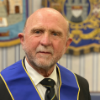
Stephen was initiated into Freemasonry in 1978 in Tylney Lodge No. 5856 (UGLE). He was Master in 1989 & 2004.
He was Master of the Lodge of Union 38 (UGLE) in 2018. He is also a PZ in the Holy Royal Arch and PM in the Mark Degree.
Stephen served 30 years in the Metropolitan Police Service (London, England) before going into education in 2000, where he became a college lecturer and a mentor for both the college and the University of Greenwich (London, England). Now retired, he teaches Tai Chi and Qigong in the community.
Facebook: Steve Goulding-Tai Chi West Sussex–Chi at Chi
Recent Articles: in this tutorial series
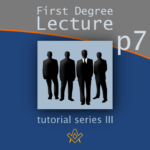 William Preston (1742 – 1818) gives his lectures in the form of a Catechism – questions and answers - and broken down into seven bite size chunks. This article is the first of the seven part series presented by Steve Goulding |
 William Preston (1742 – 1818) gives his lectures in the form of a Catechism – questions and answers - and broken down into seven bite size chunks. This article is the first of the seven part series presented by Steve Goulding |
 William Preston (1742 – 1818) gives his lectures in the form of a Catechism – questions and answers - and broken down into seven bite size chunks. This article is the first of the seven part series presented by Steve Goulding |
 William Preston (1742 – 1818) gives his lectures in the form of a Catechism – questions and answers - and broken down into seven bite size chunks. This article is the first of the seven part series presented by Steve Goulding |
 William Preston (1742 – 1818) gives his lectures in the form of a Catechism – questions and answers - and broken down into seven bite size chunks. This article is the first of the seven part series presented by Steve Goulding |
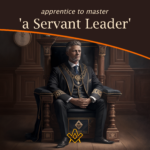 Apprentice to Master, “a Servant Leader”. Freemasonry is a learning platform used to improve a lifestyle which is morally, educationally and spiritually sound. To guide a person through life in order to be the best they can be. A Master, or ‘Servant Leader,’ develops those people in their care. They are someone who can guide others using the principles of Freemasonry - By Stephen J. Goulding |
 William Preston (1742 – 1818) gives his lectures in the form of a Catechism – questions and answers - and broken down into seven bite size chunks. This article is the second of the seven part series presented by Steve Goulding |
 William Preston (1742 – 1818) gives his lectures in the form of a Catechism – questions and answers - and broken down into seven bite size chunks. This article is the first of the seven part series presented by Steve Goulding |
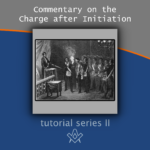 Commentary on the Third Degree Charge The Third Degree Charge invites the candidate to reflect on his life as both a ‘moral’ and ‘educated’ man, and to contemplate on what may be missing in his life. The ‘genuine secrets of a Master Mason’. |
 Commentary on the Second Degree Charge In the second degree we learn about being an educated man. Skilful, not only in the Craft itself but also how to communicate and manage others. This Commentary looks at the second degree charge in detail. |
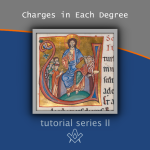 The ‘Old Charges’ have come down to us, containing the rules and regulations by which Lodges should be run and the moral and social standards to which each Lodge member should adhere. |
 Steps to the Making of a Master. The symbolism of each step of the winding staircase is to continue your personal development throughout your life, right up to your last breath in this world. |
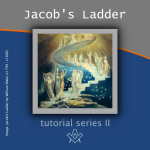 On the First Degree tracing board the most dominant feature is Jacob’s Ladder stretching from Earth to Heaven. Being straight, it is the shortest and quickest way to reach heaven, and being straight you can see the end goal. |
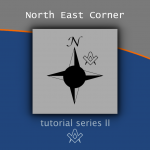 The North East Corner: A Lesson on Charity The ritual of the North East corner is a powerful piece of teaching. Let us examine that piece of ritual more closely; the lesson on charity. |
 When we look at the ritual book the deacons are told to ‘perambulate’ with the candidate. So what does this really mean? |
 The taking of a ‘Vow of Fidelity’. Oaths, Vows and Covenants |
 Morality veiled in allegory and illustrated by symbols A phrase that immediately comes to mind when describing Freemasonry – Morality veiled in allegory and illustrated by symbols. Let us have a look at what this phrase actually means. |
 Officers of the Royal Arch - The Principals The Principals' role in the Royal Arch, representing the pinnacle of spiritual leadership. Their esoteric significance lies in the unity of the three aspects of the divine, emphasizing the importance of harmony and balance in attaining spiritual enlightenment. The Principals embody the ultimate goal of the Royal Arch journey - the realization of divine wisdom. |
 Officers of the Royal Arch - Scribe Ezra Scribe Ezra is portrayed as a crucial figure within the Royal Arch, responsible for interpreting and teaching divine laws. The significance of his role lies in the pursuit of understanding and applying sacred knowledge, emphasizing the transformative power of wisdom when applied to one's life. |
 Officers of the Royal Arch - Scribe Nehemiah Scribe Nehemiah's responsibility within the Royal Arch, is that of preserving the sacred teachings. Scribe Nehemiah symbolizes the importance of maintaining accurate records and upholding the integrity of divine knowledge, thus reflecting the value of safeguarding spiritual wisdom for future generations. |
 Officers of the Royal Arch - The Sojourners The Sojourners, are seekers of truth, their journey symbolizes the spiritual path to enlightenment. Their role in rediscovering lost wisdom highlights the esoteric concept of regaining divine knowledge through perseverance and self-discovery. |
 Commentary on the Charge after Initiation A more detailed explanation in order for us to understand the Charge after Initiation |
 Officers of the Royal Arch - The Janitor The Janitor, is a crucial officer in the Royal Arch. Symbolically, the Janitor represents the guardian of sacred knowledge, ensuring only worthy individuals gain access. This function emphasizes the importance of maintaining spiritual purity and safeguarding the mysteries of the Royal Arch. |
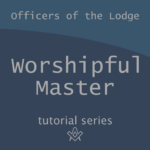 Officers of the Lodge - Worshipful Master Worshipful Master: the highest-ranking officer in the lodge, is the embodiment of wisdom and authority. The Worshipful Master guides the brethren on their spiritual path, representing the divine light that illuminates the Masonic quest for knowledge and self-discovery. |
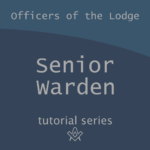 Officers of the Lodge - Senior Warden Senior Warden: embodies the essence of strength and stability within the lodge. As the pillar of support for the Worshipful Master, the Senior Warden symbolizes the fortitude required on our spiritual journey, inspiring us to persevere in the face of adversity |
 Officers of the Lodge - Junior Warden Junior Warden: Ensuring the well-being of the brethren during the lodge's hours of refreshment. Representing the virtue of temperance, the Junior Warden reminds us to find balance in our lives and cultivate moral discipline in our pursuit of truth. |
 Officers of the Lodge - Deacons Deacons: The messengers and intermediaries within the lodge. Representing the communication between the material and the spiritual realms, Deacons symbolize the importance of transmitting knowledge and wisdom as we strive for personal growth and enlightenment on our Masonic journey. |
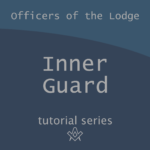 Officers of the Lodge - Inner Guard Inner Guard: Is the first line of defence against unworthy intruders, the Inner Guard represents our inner conscience and the personal responsibility we have to safeguard the integrity of our spiritual journey. |
 Tyler: The significance as the protector of the lodge's secrets and harmony. Tasked with guarding the entrance, the Tyler symbolizes our spiritual and moral boundaries, ensuring only worthy candidates are allowed into the sacred space of Freemasonry's teachings and rituals. |
masonic knowledge
to be a better citizen of the world
share the square with two brothers

click image to open email app on mobile device



